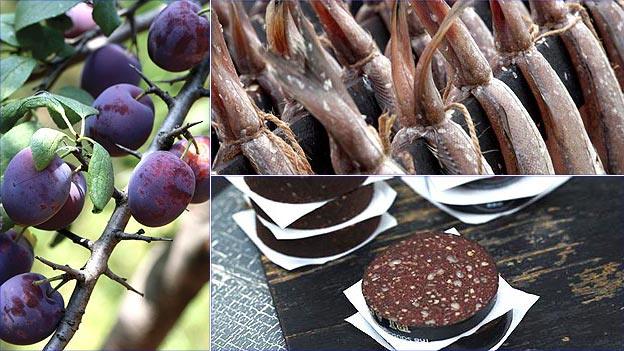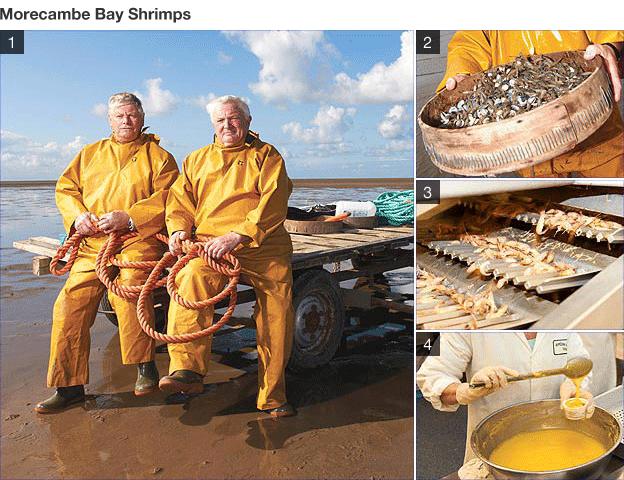Forgotten foods: Getting them back on the table
- Published

Black pudding made from fresh blood may not be something you think is worth fighting for, but it is part of the battle to bring Britain's forgotten food back into supermarkets and our homes.
It's not your average culinary dilemma, but then again it's not the average ingredient. How do you transport fresh pigs' blood quickly enough to make black pudding before the blood coagulates?
Nowadays a dried blood-powder mix is used, but it doesn't taste anywhere near as good as using fresh blood, say connoisseurs of the food.
It's is just one of the challenges facing a growing movement of people trying to revive the country's forgotten foods and, most significantly, get them back into supermarkets.
In recent years there has been a growing appreciation of Britain's distinctive regional foods. Many people have embraced farm shops, farmers' markets and specialist shops.
There's also been growing protection, like the EU's Protected Designation of Origin (PDO). But while it protects how the foods are made and allows producers to promote them as the real deal, it doesn't get them back on the supermarket shelves.
And that is crucial when reviving anything because it is where most people buy their food, say campaigners.
"However much foodies stamp their feet and say they only want us to use local shops, they have to accept that supermarkets are here to stay," says food writer Matthew Fort.

Tractors: Carried out in the shallow waters, sand and mud of Morecambe Bay on the Lancashire coast, shrimping has been a traditional occupation in the area since the 18th Century. Les Salisbury and Billy Barlow are among only three shrimp producers left on the bay
Sieving: They use tractors to cross the dangerous estuary sands, relying on their knowledge of the shifting quicksands and tidal patterns. Originally it would have been a horse and cart. Whatever is caught is sifted through a wide-mesh sieve, called a sevenpenny riddle, to pick out anything that isn't a shrimp
Boiled: Although available cooked in the shell, they are most famously "potted". This involves boiling them in large vats of water back at the factory; traditionally it would have been seawater. They are then cooled and graded by size
Potted: They are then shelled, some of which is still done by hand, then preserved in spiced, clarified butter -potted shrimpsare usually served cold with thin toast
"They have a big part to play in bringing back good British food that is threatened. The tastes and textures of these products are exquisite, as good as anything from around the world. Real historic and social significance are also tied up in them."
A growing movement is starting to tackle the problem. The Forgotten Food Scheme has been launched by Booths, a supermarket chain in north-west England, and Slow Food UK, an organisation that aims to reconnect people with good food.
"It's about getting these foods back into mass circulation," says Chris Dee, trading director of Booths, which has 28 supermarkets. "It's the right place for them, not just in some obscure little deli that most people are too intimidated to go into."
Foods are threatened for a number of reasons. The skills needed to produce them are dying out; fashions change; also, modern food production and laws make some inconvenient and expensive to make.
The scheme is aiming to revive eight foods - including meats, cheeses and fruits, in its first year and get them on sale in large quantities in supermarkets. It hopes by committing to stocking the food, suppliers will then have the security to possibly expand and supply other supermarkets. It has also set itself the challenge of using only local producers.
The double-curd Lancashire cheese it has picked is unique in the UK because of the way it is made. Other products have posed significant challenges.
"It's a tall order with products like the fresh-blood black pudding; we are basically starting with something that is almost illegal to make now," says Dee.
Traditionally, butchers would have used fresh blood in all black pudding, but now slaughtering is done separately in large abattoirs. It causes logistical problems as fresh blood deteriorates quickly, so needs to be used quickly. Also, strict laws now cover its use and a special licence is needed even to transport it. Most producers now use a dried blood-powder mix.
In the case of the traditional-cure York ham, it has meant not only creating a sustainable source of rare breed pigs, but persuading the person with the skills to create the traditional cure to come out of retirement.
"This scheme isn't just a declaration or about putting a logo on packaging," says Catherine Gazzoli, chief executive of Slow Food UK. "It's a lot of work and you need a lot of patience."
Slow Food has been listing and supporting rare foods, products and animals for years through its Ark of Taste. Luckily, some skills and foods have also been kept alive by small communities or a few producers.
Chris Battle from Keighley in West Yorkshire has been curing meat for more than 50 years. He now hand-cures the York ham for Booths, each one taking three months.
"Over the years I have developed something I am so proud of. I have always had lots of local customers, but I want the food in supermarkets. I want as many people as possible to taste it because it's proper food."
Smaller producers are confronted with a series of problems when trying to get their food into larger stores.
"It's extremely difficult to even get that first meeting with buyers from the big supermarkets," says Irene Bocchetta, protected food names manager at ADAS, the body responsible for handling UK applications for schemes like PDO.
"But things are changing. Supermarkets are thinking differently and no longer have such a blanket approach to things. It's now OK if a small company can only produce stock for five shops and not the entire nationwide network of stores. They have started putting the product just in those five shops. It's like people have finally started waking up and understanding the issues."
Traditionally, there has also been little financial support for small retailers. It is available but very piecemeal, say those in the food industry.
Jersey black butter is one local product that has successfully expanded. Not produced on such a commercial scale before, it is now stocked in Waitrose in Jersey and 60 shops in the UK. Fortnum and Mason even stocks it.
A traditional delicacy of the island, the jammy conserve is made from apples cooked down with black treacle, liquorice, cider, brown sugar and spices. Recipes date back to the 1400s.
Tim Crowley, managing director of the La Mare Wine Estate in Jersey where it is made, says he now sells up to 90,000 jars a year and has a growing international market.
"We've taken something that hasn't existed commercially before and put it on shop shelves, not only in Jersey but much further afield," he says.
"It's a product with so much history, but we have made it in a modern way. The key is it still tastes exactly the same as the traditional stuff. You can't lose the soul of the product in the modern process."
It took hard work, he says. An important part was making it economically viable for everyone - himself, retailers and the customer. It's the same for all such foods.
"These products will live and die by their quality and price," says Dee. "They're not excessive in price, more like supermarket's premium range, but they taste so much better."
The products are now starting to be introduced into Booths stores. The fresh-blood black pudding is still a work in progress, but it will come.
"This is where a degree of northern belligerence comes into it," says Dee. "We just don't see why we can't have these products on our shelves, whatever laws have changed since they were last around."
- Published9 March 2011